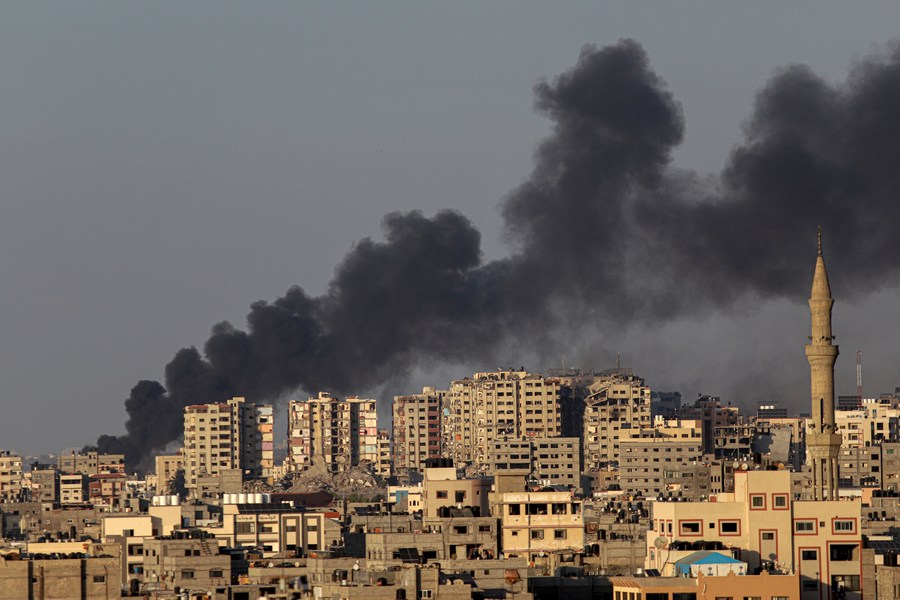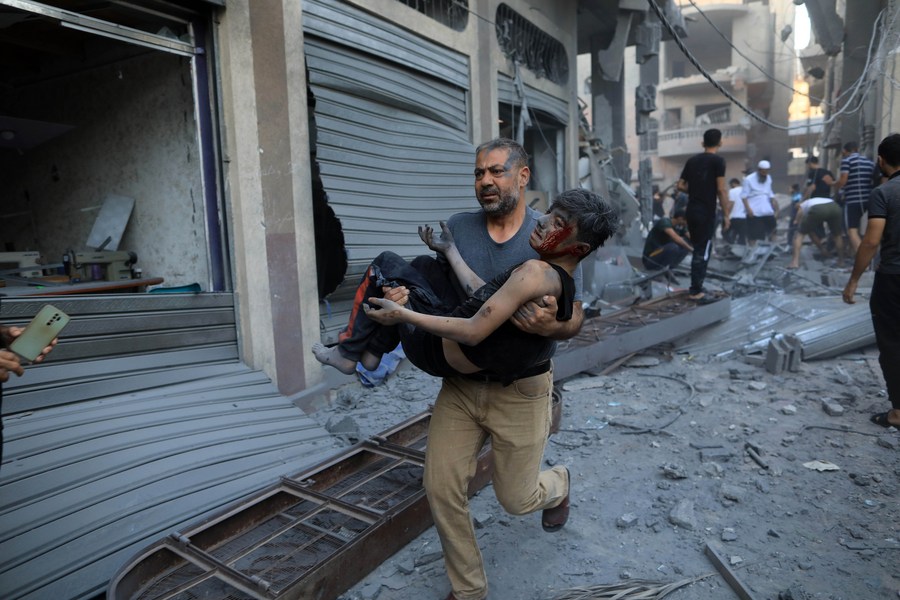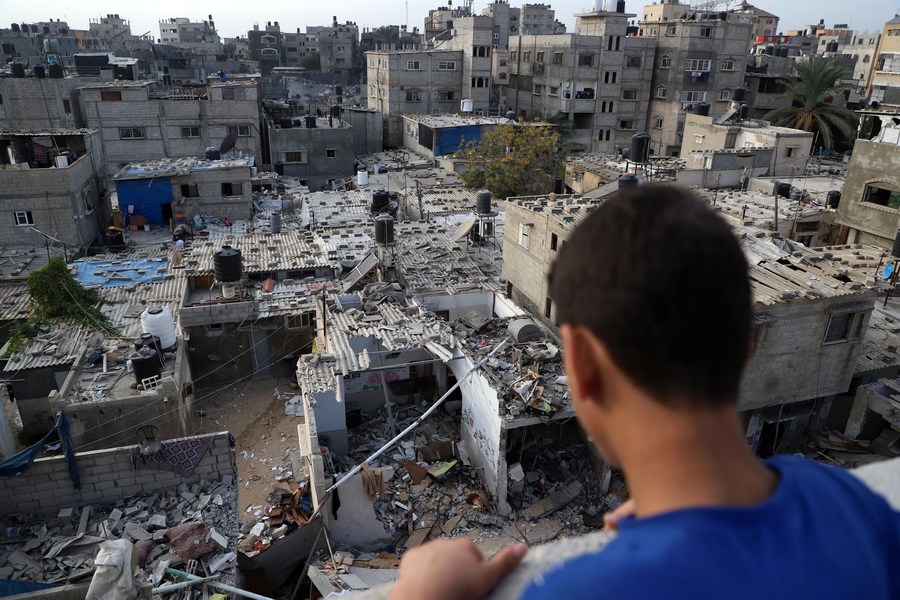* As Israel vows a "long and hard war" against Hamas, political analysts cautioned against a protracted conflict that could extend for months or longer, cause a worse humanitarian catastrophe and spill over into the Middle East.
* The month-long conflict has displaced around 1.4 million people in the enclave with a population of around 2.3 million, according to the United Nations.
* Political watchers in the region opine that no swift resolution to the ongoing conflict in Gaza is on the horizon. Meanwhile, they suggest Israel may avoid a full-scale offensive but target specific sites, due to international pressure.
JERUSALEM/GAZA, Nov. 6 (Xinhua) -- Among the debris, a father was desperately searching for his children after Israeli warplanes struck the Bureij refugee camp in central Gaza on Thursday.
"Saeed," the father called his son's name repeatedly in a trembling voice, as he sledgehammered his way through the thick, collapsed concrete. After several futile attempts, he hurled the hammer, ejaculating, "Did I not tell you to take care of your sister?" Still no answer from beneath the rubble.
This heart-wrenching moment was captured on video and quickly went viral on the internet, adding to the global calls for a ceasefire in the ongoing Palestinian-Israeli conflict. Despite the pleas, the conflict rages on, claiming the lives of hundreds of Palestinians on a daily basis, with no sign of abating.

Smoke billows following an Israeli airstrike in Gaza City, on Oct. 12, 2023. (Photo by Rizek Abdeljawad/Xinhua)
The conflict will reach the one-month milestone on Tuesday and the death toll in Gaza has exceeded 10,000, with over 4,100 being children, according to the latest number reported by the Palestinian health ministry in Gaza. In Israel, at least 1,400 people have been killed, mostly civilians in the initial Oct. 7 Hamas surprise attack that triggered the latest round of conflict.
As Israel vows a "long and hard war" against Hamas, political analysts cautioned against a protracted conflict that could extend for months or longer, cause a worse humanitarian catastrophe and spill over into the Middle East.
MOUNTING HUMANITARIAN CRISIS
One month into the conflict, Israel is expanding its ground offensive in the Gaza Strip on top of airstrike campaigns.
Israeli Prime Minister Benjamin Netanyahu said the attacks entered the "second stage" when the Israel Defense Forces (IDF) carried out more ground operations on Oct. 27. Since then, the Israeli army has been navigating its ground offensives in Gaza while intensifying airstrikes across the coastal enclave.
The IDF also announced its success in dividing the Gaza Strip, separating the southern and northern parts, and encircling Gaza City, the enclave's main urban center.
However, Samer Anabtawi, a Palestinian political analyst, said the army only made "some progress in the no-man's land in the northern and northeastern borders of Gaza," and he expected much stronger resistance if the IDF penetrated Gaza as the presence of large-scale tunnels posed a significant threat to the Israeli soldiers.
The month-long conflict has displaced around 1.4 million people in the enclave with a population of around 2.3 million, according to the United Nations.
Save the Children, an international charity organization, said on Thursday that one child is killed every 10 minutes in Gaza right now and mothers are writing their children's names on their hands so that, if killed, they can be identified.
In addition to the daily bombardments, a blockade has cut off the supply of essential resources like food, water, electricity, and fuel, causing immense suffering for those who have managed to survive the month-long hostilities.
UNICEF Spokesperson James Elder said last week that Gaza's water production has dwindled to a mere 5 percent of its usual daily output, posing an increasing danger of child deaths, particularly among infants.
Moreover, one-third of hospitals and two-thirds of clinics in Gaza are unable to function, and the remaining facilities are grappling with overwhelming demands with extreme shortages of medical supplies and fuel. The World Health Organization said doctors in some hospitals have to perform surgeries on patients without anesthesia.

A man transfers an injured child after Israeli airstrikes in the southern Gaza Strip city of Khan Younis, Oct. 19, 2023. (Photo by Yasser Qudih/Xinhua)
ISRAEL UNDER PRESSURE
With the increasing death toll in Gaza, Israel is facing growing pressure from the international community.
Jordan, Türkiye, Chile, and Colombia have recalled their ambassadors in protest of Israel's attacks in Gaza, while Bolivia has severed diplomatic ties with Israel.
According to Murat Yesiltas, a scholar on geopolitics at Ankara Social Sciences University, Israel's operations in Gaza could jeopardize its rapprochement with Arab countries and Türkiye.
The scholar warned that Israel's normalization agreements with the United Arab Emirates, Bahrain, and Morocco could face backlashes, and that Saudi Arabia had put its normalization process with Israel on hold.
The normalization of relations between Türkiye and Israel, he said, may face more hurdles, especially since Ankara adopted a tougher stance on the matter.
Meanwhile, Israel is also under domestic pressure as the economic cost of the conflict mounts.
The Ministry of Finance and the Bank of Israel have estimated that the war costs stand at about 1 billion shekels (around 250 million U.S. dollars) per day, both in direct and indirect expenses. The estimate assumes a conflict on one front against Hamas, without a regional escalation.
A poll published by the Israeli daily Maariv on Oct. 27 showed that nearly half of Israelis call for caution in the Gaza Strip ground operations and prefer Benny Gantz, the leader of the National Unity Party, as prime minister.
The poll found that 29 percent of Israelis supported an immediate ground offensive in Gaza, 49 percent preferred waiting a bit longer and 22 percent had no clear opinion. It exhibits a major plunge from a week earlier when a similar poll showed 65 percent backing a large-scale ground operation in Gaza.
Netanyahu also faces mounting pressure from families of over 240 people still held hostage by Hamas in Gaza. He has reiterated on various occasions that there will be no ceasefire without the return of the hostages. Only four of them were released by Hamas, and one soldier was rescued by the Israeli army during its ground operations.
PEACE OUT OF SIGHT
Political watchers in the region opine that no swift resolution to the ongoing conflict in Gaza is on the horizon. Meanwhile, they suggest Israel may avoid a full-scale offensive but target specific sites, due to international pressure.

A boy looks at rubble of buildings destroyed in Israeli airstrikes in the southern Gaza Strip city of Khan Younis on Oct. 29, 2023. (Photo by Rizek Abdeljawad/Xinhua)
Anabtawi, the Palestinian analyst, pointed out the likelihood of a temporary pause in confrontations as Israel causes an international outcry. Nevertheless, he believes that a long-term peaceful solution or a permanent ceasefire is not in sight.
However, international pressure would make the Israeli military scale back its presence in Gaza and focus on raids against specific targets, and that will potentially prolong the conflict if Israel tends to achieve its target of "destroying Hamas entirely."
Iranian political analyst Mohammad Ghaderi said the longer the conflict lasts, the more dangerous it gets. He said Iran's allies in the region, such as Hezbollah in Lebanon and the Houthis in Yemen, are trying to be actively involved in the conflict.
Israel is also trying to contain the conflict in Gaza to avoid fighting on multiple fronts.
"We are defending our northern border and conducting operations in Gaza -- these are our priorities. We have no interest in war on our northern border, but we are prepared for every (possible) mission," said Israeli Minister of Defense Yoav Gallant on Saturday when holding a situation assessment.
But such an equilibrium is fragile. Anabtawi warned that the situation may not necessarily go as they wish.
"From an abyss perspective, this war will affect the entire region," he said. (Video reporters: Liu Weijian, OHOOD AL-JAGHOUB, Kamal, Osama, Zhang Tianlang, Wang Hao,Yu Fuqing, Yang Yiran; Video editors: Zheng Xin, Luo Hui)■












